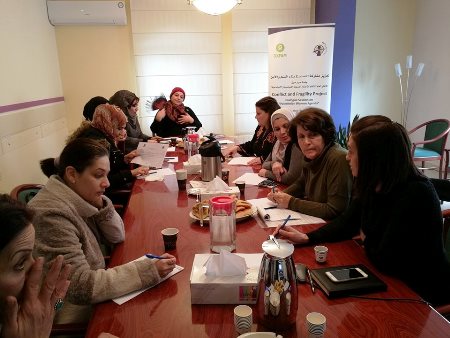|
'WIFAQ' Committee meets at MIFTAH to discuss Palestinian Central Council decisions and reconciliation
As part of the WIFAQ Committee’s efforts, which MIFTAH supports, to promote women’s participation in peace and security building, in particular efforts to achieve national reconciliation, MIFTAH held a meeting at its Ramallah office for WIFAQ members in the West Bank along with Gaza Strip members via videoconferencing. The meeting was aimed at briefing WIFAQ members on the Cairo meeting between Palestinian factions, which took place in October, 2017 and to discuss the decisions made by the Palestinian Central Council in its last session. The members also discussed the meeting between Hamas leader Yehya Sinwar with women in the Gaza Strip. The meeting hosted Ms. Majeda Masri, a women’s leader who participated in the Cairo meetings and the Central Council sessions. Masri said the overall gist of the Cairo meeting was a demand to lift the sanctions off of Gaza and not to link them with the government’s enablement to assume its duties there. She maintained that the Egyptian role shifted from one of facilitator and host to one of guarantor for implementing the decisions. Masri also briefed WIFAQ members on the Palestinian Central Council meetings and its closing statement, which included several decisions, stressing on the importance of implementing these decisions, particularly those in regards to referral of the settlement and Gaza invasion files to the International Criminal Court and creating mechanisms for economic, security and political disengagement from Israel. This, she maintained, was imperative given that the Central Council acknowledged that the interim period had come to an end. She said the main flaw in the closing statement was that it did not include a call for the committee to revive and develop the PLO. “There are major responsibilities on everyone today,” Masri said. “Most importantly is to get the Palestinian internal issues in order, the need to unite around one decision, which is popular resistance, internationalize the struggle and formulate social and economic policies that reinforce the steadfastness of the people.” WIFAQ committee members in the Gaza Strip then spoke about the outcome of their meeting with Yehya Sinwar, which included briefing women’s groups and civil society organizations on the developments in the reconciliation file. Sinwar referred to the most recent Cairo meeting where the topic of enabling the national consensus government to carry out its duties was discussed. The Gaza members also briefed the women on the challenges to implementing the understandings reached in this file. At the end of the meeting, the women participants agreed to draft a statement clarifying the position of the WIFAQ-The Women Shadow Committee to the official national committees - in regards to the recent Central Council decisions and to the slowdown in implementing the reconciliation agreement. WIFAQ is a women’s committee pressing for the achievement of national reconciliation through implementation of the agreements between the two rivals.

http://www.miftah.org |